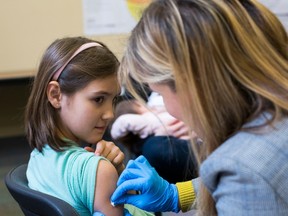B.C. health officials are urging people to make sure they’re vaccinated against measles before travelling for spring break.

Article content
One case of measles was reported over the weekend in B.C., the first confirmed case in the province amid a global rise in measles outbreaks.
The case is also the first recorded case of measles in the province since 2019, said the health ministry.
Article content
At least nine cases have been reported in Canada outside of B.C. in the first two months of the year, with most of the cases in people who are not vaccinated or fully vaccinated and travelled to countries where measles is spreading. In comparison, 12 cases were reported in 2023.
Advertisement 2
Article content
The rise in cases has prompted B.C. health officials on Monday to urge people to make sure they’re vaccinated before travelling for spring break.
Measles is a highly-contagious airborne virus, which does not require close contact to be transmitted.
The virus can live in closed areas, such as bathrooms, for up to two hours after an infected person has left. Infections can cause fever, red eyes, cough, runny nose, and a rash. Most people recover within a week or two. Severe complications could include deafness, brain damage and even death.
Measles can spread quickly in school settings.
“(Following) a single case of measles in a school, children who are not immunized or not fully immunized are offered vaccine or excluded from school,” said a statement from the Health Ministry, B.C. Centre for Disease Control, and the provincial health officer.
They urged parents and guardians to check their child’s immunization records are up-to-date in the provincial immunization registry.
In B.C,. the measles vaccine is given as a two-dose series.
The first dose is given as part of the measles, mumps and rubella (MMR) vaccine on a child’s first birthday, while the second dose is usually given around the time the child starts school as the measles, mumps, rubella and varicella (MMRV) vaccine, which also includes protection against chickenpox.
Article content
Advertisement 3
Article content
Children between one and four can also get their second dose before travelling internationally, said health officials. Babies as young as six months should also get their measles shot before travelling to countries where measles outbreaks are reported.
Health officials recommend children get their first dose at least two weeks before travel to give the child’s body time to build immunity.
Adults born in 1970 or later are also recommended to have received two doses of a vaccine before international travel.
Last week, Dr. Theresa Tam, Canada’s chief public health officer, raised concern that a “global surge” in measles activity “could lead to an increase in imported measles cases, potentially resulting in transmission in communities in Canada.”
People can book their vaccine appointments through local pubic health units, community health centres, or nursing stations (Find a location here). Children four years or older and adults can also get their vaccine through a pharmacist.
Fraser Health is offering extra clinics during spring break for school-aged and childhood immunizations, including the MMRV vaccines.
Advertisement 4
Article content
Federal data from 2021 shows that nearly 92 per cent of two year olds in Canada have received at least one dose of a vaccine against measles, but only 79.2 per cent of seven-year-olds have received the second dose.
In February 2019, Vancouver Coastal Health declared a measles outbreak in Vancouver after several cases were reported.
The World Health Organization has reported a 79 per cent increase in the number of global measles cases in 2023, compared to 2019. Nearly half of cases are among children five years and younger. The increase was due in part to a decline in vaccinations that occurred during the COVID-19 pandemic.
With files from Canadian Press
Recommended from Editorial
Article content





